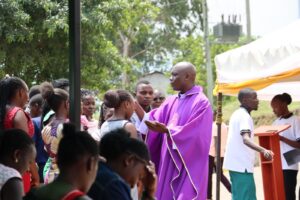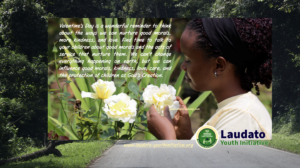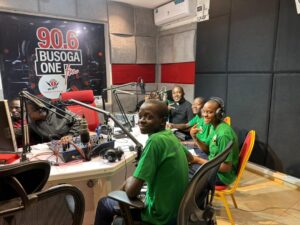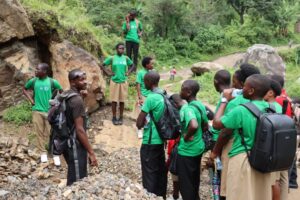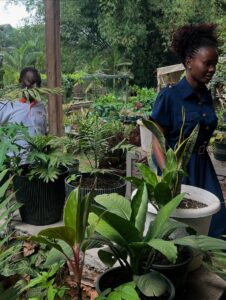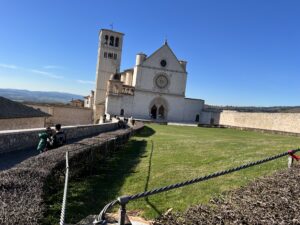By Immaculate Kisembo | September 24, 2025
The Laudato Youth Initiative (LYI) continues to strengthen its presence and impact across Uganda through school-based engagements that promote youth-led climate action and ecological education. On our September 23rd 2025 visit to Ave Maria Secondary School, the LYI leadership team (Mr. Benard Kahwa – Executive Director, Immaculate Kisembo, Programs Manager and Fred Ayebale – Media) was met with a warm and enthusiastic welcome as they held an enriching session with the school’s Laudato Si Club, under the theme: “Building Climate Resilience through Collective Action.”


We were graciously received by Sr. Mildred Asiimwe, the Head Teacher, along with the school leadership team, including Sr. Marceline Twinomugisha, Deputy in Charge of Administration, and Mr. Peter Onap, Deputy in Charge of Academics and the Club Patron. Sr. Marceline led a reflective session in the main hall, as we introduced the initiative and its relevance to the school’s environmental values, while Mr. Onap has been instrumental in guiding the club’s day-to-day activities.

Youth Taking the Lead in Environmental Stewardship
Like many schools across Uganda embracing environmental consciousness, Ave Maria’s Laudato Si Club is actively engaged in regenerative environmental practices. Students are addressing plastic pollution, maintaining green spaces, and promoting a culture of eco-consciousness among their peers, a trend increasingly seen in Catholic-founded schools and our clubs inspired by Pope Francis’ encyclical Laudato Si’.

During our visit, students expressed their passion through skits, a short play, and creative speeches, all echoing the urgent need for environmental care. A Q & A session created space for open dialogue, showcasing the students’ strong grasp of the climate issues affecting their communities. This informs our desire to mentor the club into more action activities and community engagement beginning from individual conversion and commitment, to the schools’ collective efforts and engaging their neighboring communities. Students are now agents of change when schools like Ave Maria teach eco conscious values to their students they return home as agents of change in their families.


Planting Seeds of Change
In alignment with the LYI’s flagship campaign, the One Million Tree Planting Drive, the session included a practical activity where fruit and indigenous trees were planted on school grounds. These trees, selected for both ecological and nutritional value, will contribute to shade, biodiversity, soil stability, and food security, a core aspects of resilience-building in Uganda’s climate-vulnerable regions.



The team also facilitated a session on agricultural innovation, emphasizing climate-smart agriculture and sustainable food systems. This aligns with broader national efforts to integrate climate education into school curriculums, and mirrors successful models from our other Laudato Si Clubs in other parts of Uganda where environmental stewardship is combined with hands-on agricultural learning. Pope Francis helps us to see that an integral ecology calls for openness to categories which transcend the language of mathematics and biology into real action of ecological conversion.
Symbolic Recognition and a Call to Action
To conclude the visit, the club was presented with a Laudato Si Club flag and emblem, symbolizing unity and commitment to the mission of ecological conversion. This gesture mirrorsour shared practices across our Laudato Si Clubs in Uganda, where symbols such as flags, badges, or tree nurseries represent living commitments to Pope Francis’ call to “care for our common home.”



We extend heartfelt gratitude to the students, staff, and administration of Ave Maria Secondary School for their hospitality, energy, and dedication to environmental stewardship. Their involvement affirms the growing momentum of youth-led action for climate justice and sustainability in Uganda.
As we continue to expand our reach, LYI remains committed to nurturing young environmental leaders and supporting schools and communities in becoming hubs of ecological transformation. Laudato Si advises us that “Caring for ecosystems demands far-sightedness, since no one looking for quick and easy profit is truly interested in their preservation. But the cost of the damage caused by such selfish lack of concern is much greater than the economic benefits to be obtained. Where certain species are destroyed or seriously harmed, the values involved are incalculable. We can be silent witnesses to terrible injustices if we think that we can obtain significant benefits by making the rest of humanity, present and future, pay the extremely high costs of environmental deterioration. (Ls 36)









